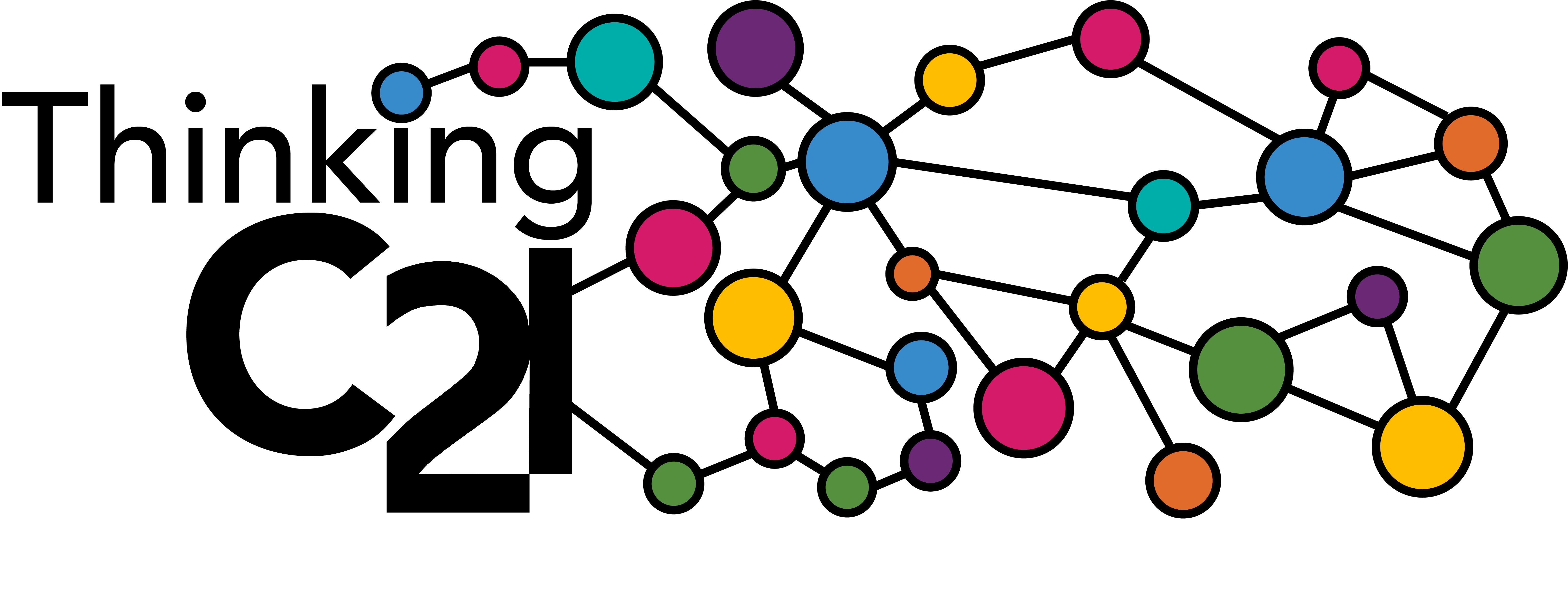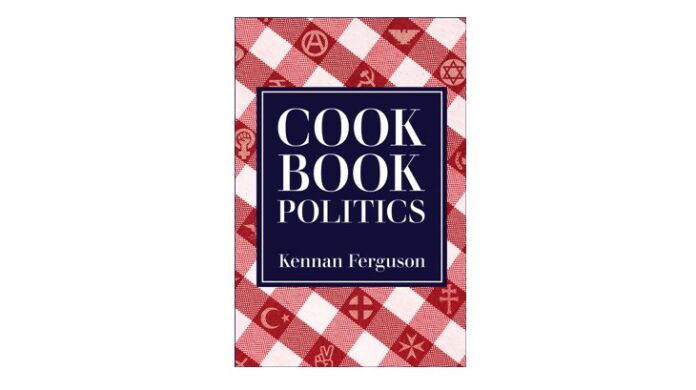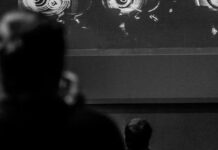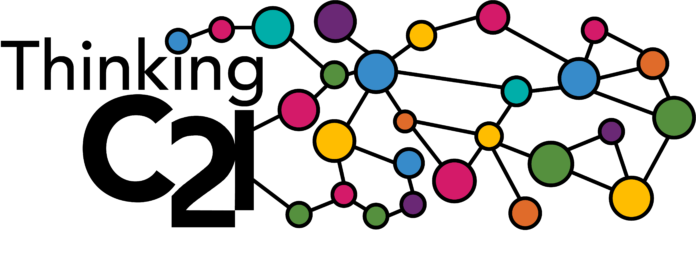Kennan Ferguson, professor of political science at UWM and former director of C21, has just published Cookbook Politics (Penn Press, 2020), an exploration of cookbooks as political objects. In it, Ferguson argues that cookbooks highlight aspects of our lives we rarely recognize as political—taste, production, domesticity, collectivity, and imagination—and considers the ways in which cookbooks have or do politics. C21’s deputy director Maureen Ryan recently interviewed him about the book.
Maureen Ryan: First, congratulations on the publication of this novel and insightful book! In it, you make a claim about the relationship between cookbooks and democracy. Is there a causal link between cookbooks and democracy? The cookbook as a form is sort of contemporaneous with modern democracy, or at the very least, contemporaneous with the Enlightenment which provided the ideological and political tools for democracy. But also, the earliest cookbooks in the West, according to Henry Notaker, date from the end of the 13th century. In other words, they begin to appear right before the rise of the printing press and the development of the book trade, and thus a society in which written texts began to circulate more commonly. Is it related to the emergence of democracy, in the sense that printed material becomes part of the way that enlightenment ideals bring democracy into fruition and also the way that recipes circulate? I’m thinking of Benedict Anderson’s Imagined Communities, which is an argument about the rise of print capitalism in constituting a sense of national identity (even though you critique his argument in chapter 3).
Kennan Ferguson: If it is a causal relationship, our polities have not yet caught up with the form of the cookbook. I’m a political scientist, and most of my colleagues in the discipline measure democracy formally. We look to voting percentages, or to surveys, or to legal proscriptions on free speech. Rarely do we consider the more radical participatory components, such as desire to transform the orderings of the community, or the sense that one person matters to the future. Where a cookbook invites the reader to make whatever uses of it she desires, even to change a recipe, our govermentalities resist that kind of participation. This book comes out during a time of protest and official malfeasance, and there does seem to be an emergent hope that activism can change the very presumptions of, say, policing, which I find hopeful.
I do think, however, that cookbooks did emerge alongside capitalism. You don’t use a cookbook if you’re making liver and onions or dahi bhalla the same way your mother did. You only need it once the large, multigenerational family has been dissolved, and you only desire it once you have new foodstuffs from faraway places. And at least in our world, those are the products of a modern economy.
MR: That’s true! Along with capitalist trade and the dissolution of the multigenerational family in favor of the nuclear family (at least in the West/US), you have the waning of the servant class, which scholars like Sarah A Leavitt identify as one reason for the popularization of the modern cookbook. They’re part of the tradition of domestic advice that arose to train newly married women in the domestic arts in the 19th and 20th centuries: in the absence of a multigenerational household where she might be trained, and without many or any servants, she was likely to have to do it all herself. It really isn’t likely until probably the 1970s (the “real men eat quiche” moment) that the intended audience for a cookbook was male or mixed gender. You do note in Cookbook Politics that the cookbook is a feminized form, and I want to talk about the implications of this for your argument. How can cookbooks have the political implications you describe—the reordering of community, the invitation to democracy—when for such a long time they were used by women, whose roles were limited primarily to the private sphere? Or, is your argument primarily about the role of cookbooks today, when their use is less circumscribed by gender?
KF: Intriguingly, that history of class relationships is also encapsulated in cookbooks. 19th century cookbooks are often oriented toward the discipline and oversight of servants, instructing the reader how to organize other people’s labor toward not only dishes but events such as cotillions or large dinner parties. The relational and regional systems of racialized power end up represented as well, in both conscious and unthinking ways, as when a Boston cookbook warns the reader that the Irish don’t know how to make bread, filling it with “soda powder” (baking soda) to save time, and highlighting the necessity of careful oversight.
The relationships between gender, genre, and cookbooks are similarly embedded in our own assumptions. As you can probably guess, I wouldn’t make a strong distinction between the public and private spheres, following instead feminist theorists who have long pointed out how the former is literally impossible without the imposition of the latter. So my argument here ends up having two parts. First, I want criticize the presumption that philosophy and cookbooks are fundamentally different projects. Assuming that “the true” or “the beautiful” are strictly cognitive questions, with no reference to bodies or environs, has led philosophical work in directions that are at best irrelevant and at worst actively reproduce oppression. Second, I want to highlight how cookbooks work much better in their encouragements, even while those are coded feminine, than do other styles of rhetorical engagement. Logical determinism reads just as masculinist as do formal debates or manifestos, and proves equally uncompelling much of the time. Why not take a page from the inspirations and blandishments of cookbooks as a better and more democratic kind of politics?
MR: You pay so much attention to the material form of the cookbook, and the relationship between the material form and the political affordances of the cookbook itself. In your thinking, The Great British Baking Show, a recipe box or a YouTube channel like Cooking with Dog cannot foster participatory democracy in the same way. Why is that; what is at stake for you? Do these other kinds of media produce different political valences or affinities? In a way, you offer your own counterexample for cookbooks as democratic in the chapter on ideology which talks at length about the Italian Futurists’ cookbook. In it, you argue, “Marinetti’s ideological project drew upon the cookbook’s potential for building national identity,” but of course it led to very different results: a Fascist sensibility.
KF: That’s an insightful and critical point. Part of what drew me to the cookbook as a philosophical kind of text is both its physical presence and its pluralist temporality. Even in their most generous and participatory forms, television shows and videos depend on development and story arcs. They are plotted. They start here, and end up there, and we need to follow them in order to enjoy them. They aim at completion, whether of a story or a dish. Cookbooks just do not demand that. I’ve probably not read most of the pages of even my favorite cookbooks, or at least I hadn’t before this project. That’s what appeals in even putatively oppositional politics, such as those of the futurists and of contemporary slow food, when they make cookbooks. But that’s their power, in that we as readers cocreate with them. That doesn’t make them more useful than a digital database or a novel, but it does make them more personal and more participatory.
MR: I wonder what is the historical context for your argument, particularly given that food and ingredients (although perhaps not cookbooks per se) played such an integral role to the formation of empires throughout history? My question here is drawn from Rachel Laudan’s great Cuisine and Empire, which you cite, and which talks through the relationship that trade and conquest had to the development of world cuisines. Cookbooks, or at the very least written recipes, existed in various ways throughout early history. How would you historicize the form of the modern cookbook?
KF: Cookbooks don’t drive those political forms: one need only look at the histories of salt or manoomin (the original Anishinaabe name for wild rice) or the spice trade to see that food interchanges have long been an important part of trade and power. Recipes and cookbooks are always dependent on those food pathways. Fortunately for me, food historians such as Laudan have already done a terrific job mapping out some of those relationships. I’m drawn to the cookbook precisely because it shows what other people made of those opportunities and intrusions: they represent moments of both novelty and interchange. How do Swedes start thinking about coffee, which is obviously not grown nearby, as part of their own national heritage and belonging? Cookbooks both mark and replicate those intensities of difference and identification. Their theorization of empire, from both directions, is marked in people’s desire.
MR: I like this idea: “cookbooks both mark and replicate those intensities of difference and identification.” That seems to me to be at the heart of your argument in the book.
KF: Exactly. That’s also at the heart of politics: we are always in solidaristic relation with some people, in part or whole, and are at the same time opposing ourselves to others.
MR: I was interested in the 4th chapter’s focus on the community cookbook, many of which were published by women’s religious organizations. What was your archive for this chapter? Where did these cookbooks—which must be amazing artifacts to read through—come from, and how did you access them? You also touch on the United Daughters of the Confederacy cookbook, for instance, a text which I was very intrigued by. How did that cookbook, for instance, not become a centerpiece to your analysis—was it a matter of access?
KF: A few libraries have cookbook collections: the Schlesinger Library at Radcliffe and the Janice Bluestein Longone Collection at the University of Michigan stand out. But community cookbooks are a different kind of text: they weren’t published the same way, sometimes they don’t have authors listed, and they’re even physically different. Many have comb-bindings, those plastic, curled, toothed spines. Others might be undated. Most libraries don’t consider them “real” books, and lack the resources or inspiration to shelve them. The best collection in the country is at Texas Women’s University, and the archive librarians there were a tremendous help,
As to your UDC question, I decided early on not to give any one community cookbook a central role. Each one I discuss has some degree of exemplarity, of course, but I tried to avoid centrality. This kind of cookbook balances out the authorship, the recipes, the credit. I wanted to replicate that generosity. However, whole projects remain to be written on many of these: I could see an entire dissertation exploring the complexities of race, region, identity, and history that make up just one cookbook.
MR: This project must have been borne out of a passion for cookbooks and cooking, right? What are some of your favorite cookbooks, and were there any in particular that spurred your thinking about or interest in this project?
KF: I hadn’t originally realized the generational nature of the most successful cookbooks: Better Homes and Garden’s New Cookbook versus, say, Mark Bittman. My own most-used—as befits my age—is Julie Rosso and Shelia Luken’s New Basics. But the ones which particularly piqued my interest, the cookbooks I read for pleasure, are the community cookbooks we just discussed. The first one to really intrigue me was inherited from my grandmother, one compiled in the 1950s by the Kalahikiola Congregational Church in Kohala, Maui. I’d see the various contributors, with mostly Chinese, Japanese, or haole (white) surnames, and marvel at how the various fish dishes, soups, and desserts reflected what I imagined to be the backgrounds of these first- or second-generation arrivals to Hawai’i were attempting to recreate and pass along. The intermixing and negotiations of these three immigrant cultures (there were very few Hawaiian names in this cookbook) fascinated me.





